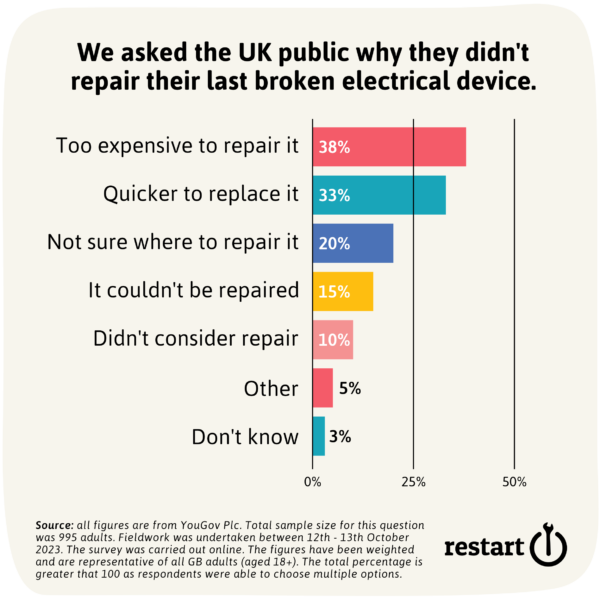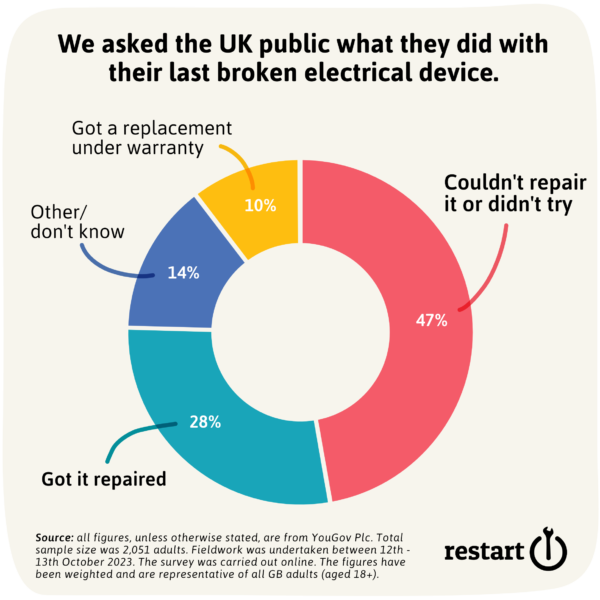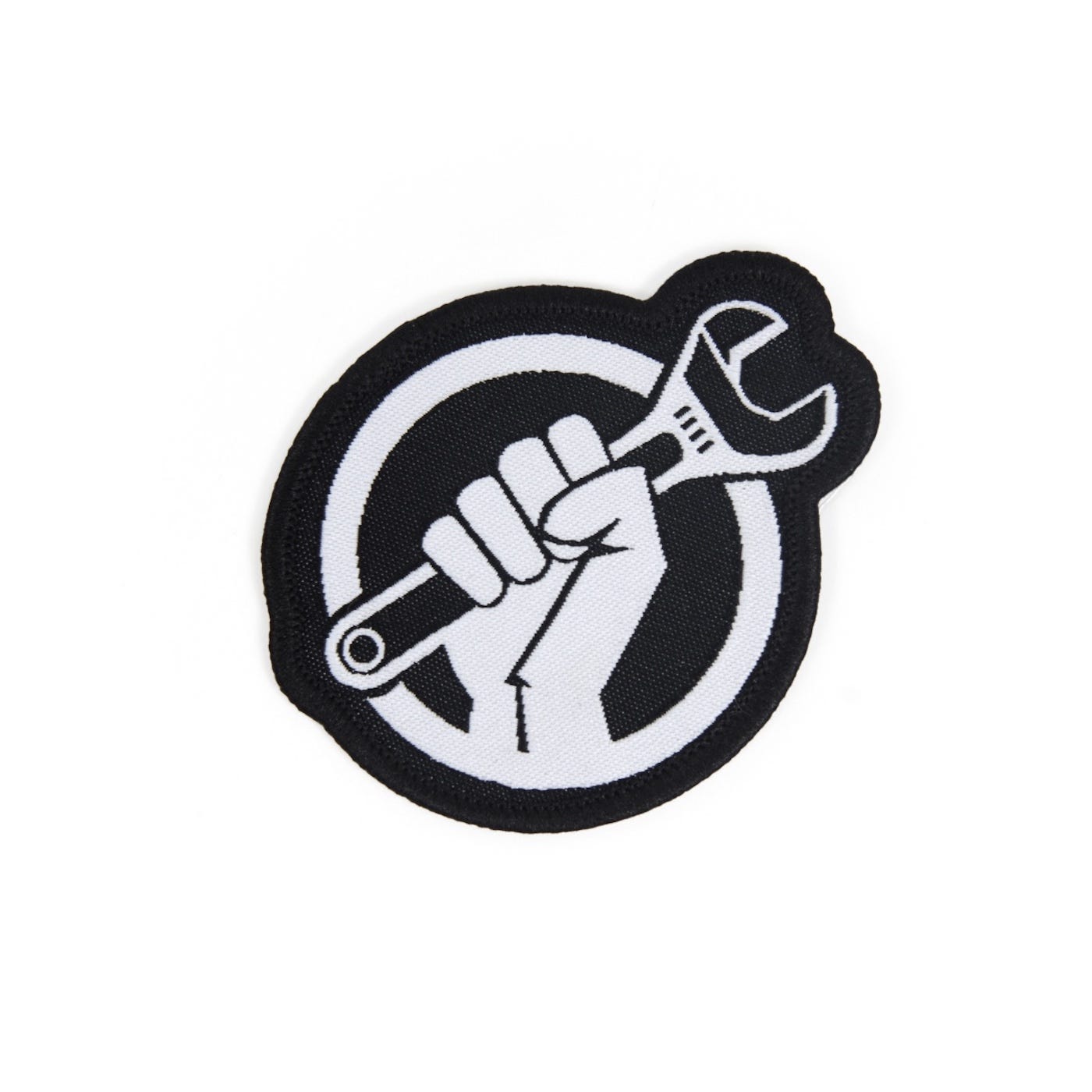On International Repair Day: Much To Celebrate
Saturday is International Repair Day. This year, there's a lot to celebrate and we show you how! Also: repair obstacles make Ford F-150 a bad buy and plastics recycling isn't what you think it is.
Saturday, October 21st marks this year’s International Repair Day, an occasion to celebrate the art of repair, teach repair skills and generally spread the word about how repair - and repairability - are central to our species goal of reducing waste, living sustainably and achieving a more circular global economy.
Note: in celebration of International Repair Day, we’re making a special, limited time offer: a year of premium access to Fight to Repair News for just $12. Use the button below to claim your offer!
And, as this year’s event dawns - there’s a lot to celebrate. As this blog has reported: the last year has brought noticeable progress in the global effort to make the ability to repair your stuff a legal right, rather than something that falls to the discretion of manufacturers - a group that is increasingly hostile to the notion of ownership.
Among the most notable achievements since the last International Repair Day:
Three U.S. states: New York, Minnesota and - most recently - California adopted comprehensive electronics right to repair laws.
The U.S. state of Colorado passed into law a right to repair agricultural equipment - the first such law anywhere in the world.
The National Assembly of Quebec enacted Bill 29, the Act to protect consumers from planned obsolescence and to promote the durability, repairability and maintenance of goods - the first such law enacted by a Canadian province.
India’s Ministry of Consumer Affairs (MoCA) launched a R2R portal earlier this year to facilitate user repairs - part of that country’s Lifestyle for Environment (LiFE) initiative.
The European Commission in March adopted a proposal on common rules promoting the repair of goods, which it claims will result in savings for consumers and support the objectives of the European Green Deal by reducing waste.
Manufacturers including Samsung, Google, Apple, Microsoft continued to ease opposition to right to repair initiatives and take steps to make their products more repairable. Notably: Apple signaled its support for California’s proposed electronics right to repair law, clearing the way for passage.
That’s nothing to sneeze at. And the momentum is only growing.
“Last year, we passed our first two non-automobile Right to Repair bills, this year, we passed three more ... and the bills keep getting stronger. Not only are we gaining ground in policy, it feels like we are winning something even more important: hearts and minds,” Nathan Proctor, the National Director of the Right to Repair Campaign at the US Public Interest Research Group told Fight to Repair News.
Repair for everyone!
Organized by the Open Repair Alliance, International Repair Day is an effort to recognize the importance of repair to our global economy and environment, and to call attention to the need to develop a culture of repair. This year’s theme is “Repair for Everyone!” That’s an effort to push past the bare “right to repair” and get policy makers to enact changes to the law that make repair a practical option for everyone.
“At a time when Right to Repair is starting to become mainstream, we need to continue fighting if we want ‘Right to Repair’ to be real and universal - and not just a slogan endorsed by manufacturers,” Ugo Vallauri, the Co-Director of the UK-based The Restart Project told Fight to Repair News.
As part of that, more than 110 organizations issued a statement that calls on the UK government to make repair more affordable, expand existing right to repair laws to cover all consumer products and to shift the focus of regulations from recycling to re-use, among other things. (Check out their statement at repairreusedeclaration.uk).
Restart Project also published a video “Who has the Right to Repair today?” which lays out the reality of repair obstacles like parts pairing and exclusionary pricing.
Vallauri said this year is the 7th edition of International Repair Day and the biggest yet, with events across Europe and the UK and coordinated national repair days scheduled in France and Switzerland, the US, India, Argentina, Chile, Taiwan, South Korea, New Zealand and Australia.
The group also launched a letter campaign asking supporters to write through our website to EU policymakers ahead of negotiations on a consumer rights legislative package on Right to Repair in the coming weeks. If you’re in the UK, check that out here: https://repair.eu/news/_repair-for-everyone-the-time-is-now/
Vallauri said polling by The Restart Project suggests that in the UK - as in other countries - there is a huge appetite for a right to repair among the general public, as well as high obstacles to repair.


"Right to Repair is a worldwide need,” Gay Gordon-Byrne, the Executive Director of the Repair Coalition told Fight to Repair News. “Every step towards a more repairable world is a step forward for everyone. The work we do here in the US isn't different from work being done in other countries other than being directed towards what our legal and legislative system allows."
Celebrate Repair Day…with Repair!
So how should you celebrate International Repair Day? Well, how about repairing something? At the local level, Open Repair Alliance is tracking more than 1,300 repair events globally in celebration of International Repair Day. These range from Repair Cafés and FixIt Clinics to “how to” events that teach repair skills and lectures. You can find one near you using their map. (The vast majority are in the EU, but there are some in the US as well.)
If you want to stay at home, but celebrate with others, check out the Global Fixers Discord, which is hosting the online component of the Cherwell Collective CIC’s joint International Repair Day Gather In on Saturday. Use the button below to get instructions on joining the Global Fixers online community.
Or you can resolve to get involved in the global movement to support repair and re-use. The Repair Coalition has, likewise, published a map of right to repair advocacy groups around the world.
Nathan Proctor of PIRG said he’s planning to celebrate with a DIY project. “I'm looking forward to celebrating repair day with my own repair projects -- and while I work on my broken coffee grinder, I'll be thinking about all the people around the world doing something similar. One coffee grinder might be a small thing, but when you think about all the progress we are making, it feels a bit more like a collective act of resistance against our throwaway mentality.“
Words to live by! Happy International Repair Day!!
Other News
Android’s planned ‘repair mode’ will keep customer data safe from snooping techs - Google is introducing a "repair mode" in stock Android devices. In repair mode, personal data is hidden, but core phone functions are accessible for repair technicians. Lockscreen credentials are required to enter and exit repair mode. The goal is to make the repair process less stressful for users and protect their privacy. Under the hood, repair mode uses the Dynamic System Updates mechanism and simulates a fresh OS instance. Google plans to release Repair Mode for Pixels in the December 2023 Pixel Feature Drop.
YouTuber: software locks that frustrate owner repair make the Ford F-150 a bad buy-The Ford F-150 is the best-selling vehicle in the U.S. since 1981, but YouTuber and mechanic Scotty Kilmer aid the F-150 is a bad buy despite its smooth ride and full leather interior. How so? because of Ram and Stellantis' approach to consumer repairs. Ram, along with Dodge and Chrysler, introduced a secure vehicle gateway protocol in 2018, making it necessary for registered mechanics or dealership mechanics to clear or reset diagnostic trouble codes (DTCs). That hinders the "right to repair" principle, where consumers should have the freedom to choose how to fix their purchased products without manufacturer interference, Kilmer said in a video posted to his YouTube channel. As a result, Kilmer does not recommend the Ram 1500.
In Maine, auto right to repair ballot measure pits automakers against repair shops - Dan Brooks supports Question 4 on Nov. 7 ballot for "right to repair" to help small auto repair shops in Maine. The ballot measure aims to standardize diagnostic systems and share information with repair shops with the goal of ensuring vehicles can be fixed outside dealerships for consumer choice. But auto manufacturers claim repair shops already have necessary information and suspect motives behind the initiative. Now it will fall to Maine voters to decide if existing repair agreements suffice.
Plastic pollution is a global crisis, with large-scale production harming the environment and human health. To combat it, a global treaty is being developed to reduce plastic production, promote reuse, and explore alternatives to plastics. While recycling and waste management help, the key is to make and use less plastic.

Small electronics like vapes, toys, and headphones, are discarded without much consideration, amounting to around 9 million metric tons of e-waste annually, with discarded vapes alone contributing 42 million kilograms to this waste stream, highlighting the need for better recycling and disposal practices.
Fast tech (similar to fast fashion) in the UK includes nearly half a billion small electrical items discarded in 2022. Fast tech ontributes to e-waste, with products like disposable vapes, decorative lighting, cables, USB sticks, and cordless headphones being among the items discarded, highlighting a lack of awareness about the recyclable materials they contain and the need for better recycling practices.
iFixit's teardown of the Meta Quest 3 VR headset reveals that its time-of-flight sensor, which enhances AR and passthrough capabilities, can fit into the Quest Pro, suggesting that Meta decided to cut this sensor late in the Quest Pro's development cycle, leaving the Quest 3 with some advantages over the Quest Pro in terms of hardware.
Circular Thinking: the economy-wide move to cut waste - The current economy is largely linear, leading to waste production. The circular economy aims to reduce waste by extending product lifespans, repairing, and upcycling, with recycling representing on a small part of the circular economy. But a shift to a circular economy requires systemic changes and incentives. Among them: manufacturers should design products with repairability in mind and making it easy for consumers to repair, re-use and upcycle products.





